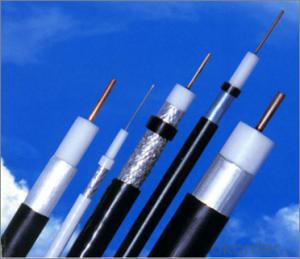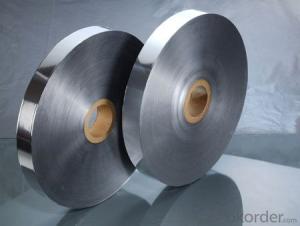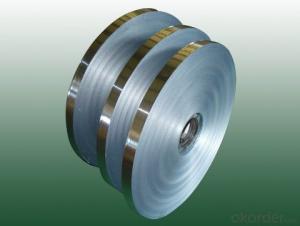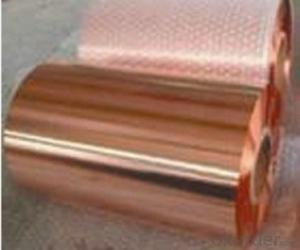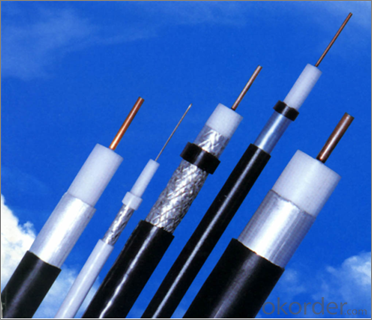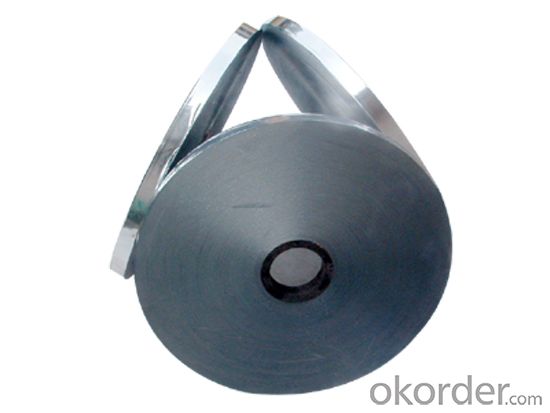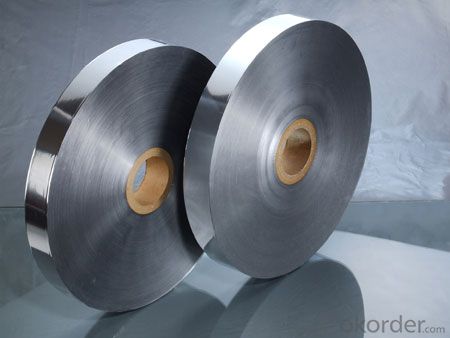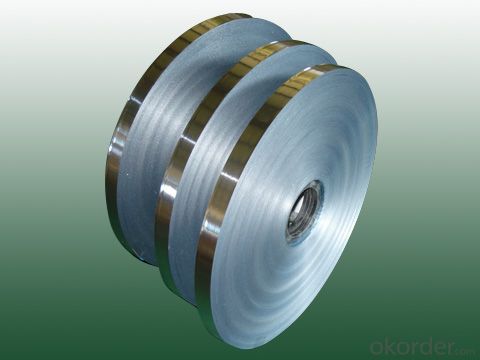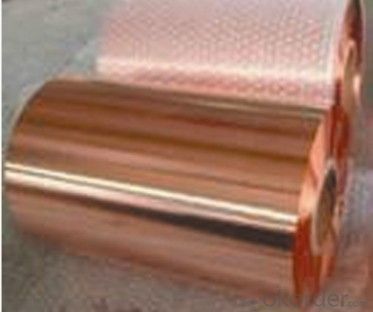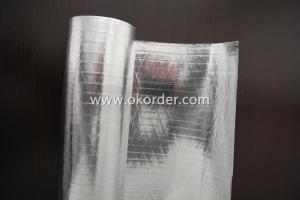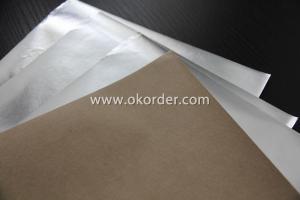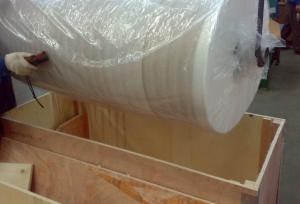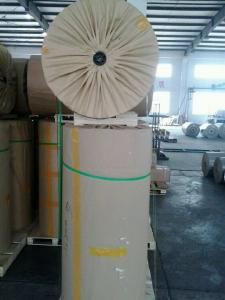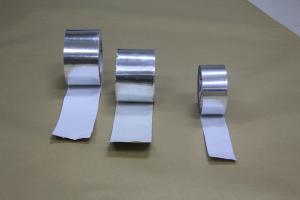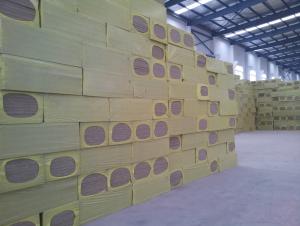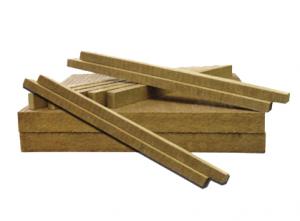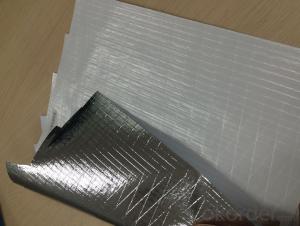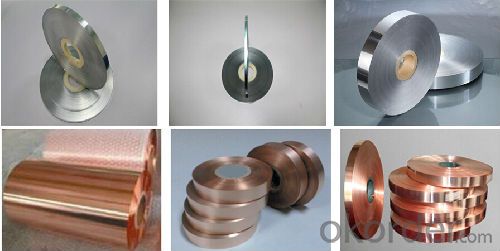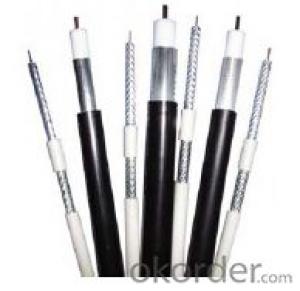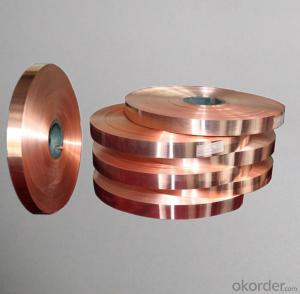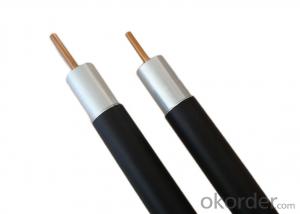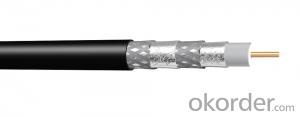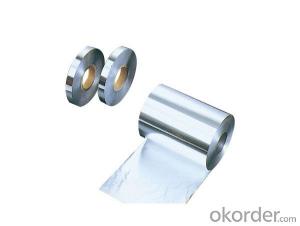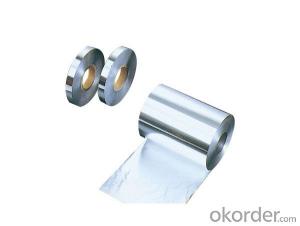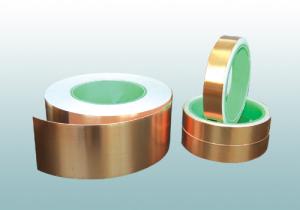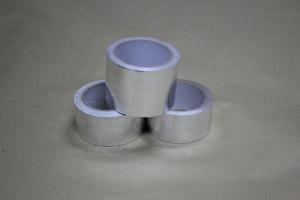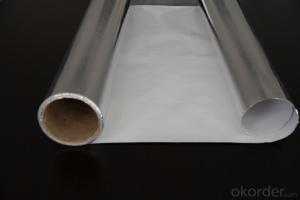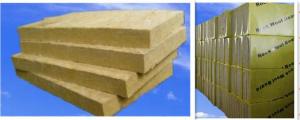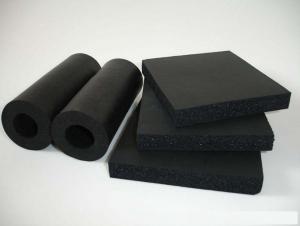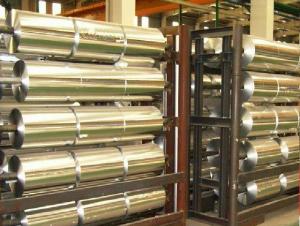Aluminum Foil Facing Heat Shield Insulation Bubble Foil Shielding Copper Polyester Foil for Coaxial Cables
- Loading Port:
- Shanghai
- Payment Terms:
- TT or LC
- Min Order Qty:
- 1000 m²
- Supply Capability:
- 1000000 m²/month
OKorder Service Pledge
OKorder Financial Service
You Might Also Like
Aluminum Mylar foil Shielding Foil for Coaxial Cable communication cable
1.Structure of Aluminum Mylar foil Shielding Foil Description:
Electrical cable is used to transfer electricity, information and the realization of electromagnetic energy transformation. The electrical cable in a broad term mainly indicates to cable and in a narrow term indicate insulation material. Its definition is the aggregation of different parts below: one or more insulation cores, the wrapping layers of the cores, the general protective layers and the outer protective layers. Cables also include additive conductor without insulator.
2.Main Features of the Aluminum Mylar foil Shielding Foil:
Aluminum Mylar foil Shielding Foil is applicable to the shielding of coaxial cable, local network wire, electronic communication cable and computer peripheral wire etc.
1.Thickness: min 6.5mic; width: 300-1000mm.
2. According to GB/T 3198-2010.
3.Usages: cable shield, candy wrap
3. Aluminum Mylar foil Shielding Foil Images
4. Aluminum Mylar foil Shielding Foil Specification
AL-PET laminated foil
Description: Apply for overall or individual twisted pair shield for electronic cable and local network cables, protect from external electromagnetic interference. Features option of LUBRITAPE apply to decrease 50% friction of aluminum surface.
Construction: Aluminum foil, Polyester film
CODE | TOTAL THICKNESS | ALU THICKNESS | GLUE | POLYESTER FILM | WEIGHT |
FP007012 | 22±3 | 7 | 3 | 12 | 38.8±5% |
FP010012 | 25±3 | 10 | 3 | 12 | 46.9±5% |
FP020020 | 43±3 | 20 | 3 | 20 | 83.8±5% |
FP025012 | 40±3 | 25 | 3 | 12 | 87.6±5% |
Special specifications are also available, according to customer’s order. | |||||
AL-PET-AL laminated foil
Description: resilient shielding in cable assembling and provide the enhanced shielding required in harsh environments.
Construction: Aluminum foil +Polyester film+ Aluminum foil
CODE | TOTAL THICKNESS | ALU THICKNESS | GLUE | POLYESTER FILM | GLUE | ALU THICKNESS | WEIGHT |
DFP007015 | 35±3 | 7 | 3 | 15 | 3 | 7 | 65±5% |
DFP009020 | 39±4 | 9 | 3 | 15 | 3 | 9 | 76±5% |
DFP015025 | 61±5 | 15 | 3 | 25 | 3 | 15 | 115±5% |
DFP025025 | 80±5 | 25 | 3 | 25 | 3 | 25 | 175±5% |
Special specifications are also available, according to customer’s order. | |||||||
Bonded AL-PET laminated foil
Description: A laminated aluminum-polyester-aluminum tape is fully bonded to the foam dielectric to provide 100% coverage, longitudinally applied over the polyethylene core and the tape minimizes signal leakage.
Construction: Aluminum foil + Polyester film + Aluminum foil + EMAA film
CODE | TOTAL THICKNESS | ALU THICKNESS | GLUE | POLYESTER FILM | GLUE | ALU THICKNESS | GLUE | EMAA | WEIGHT |
DFPH009012 | 65±5 | 9 | 3 | 12 | 3 | 9 | 3 | 25 | 98±5% |
DFPH009020 | 72±5 | 9 | 3 | 20 | 3 | 9 | 3 | 25 | 108±5% |
DFPH009025 | 75±5 | 9 | 3 | 25 | 3 | 9 | 3 | 25 | 114±5% |
DFPH010025 | 84±5 | 10 | 3 | 25 | 3 | 10 | 3 | 25 | 126±5% |
Special specifications are also available, according to customer’s order. | |||||||||
Copper polyester foil
Description: Copper foil, copper lamination foil typically use as shielding for low/medium voltage cable and radio frequency coaxial cable. The rolled annealing copper foil is flexible to wrap cable core, also it has the excellent physical properties, Polyester film provides electrical insulation and high mechanical properties.
Construction: Copper foil + Polyester film
CODE | TOTAL THICKNESS | CU THICKNESS | GLUE | POLYESTER FILM | WEIGHT |
CP018012 | 33±3 | 18 | 3 | 12 | 175±10% |
CP007020 | 46±3 | 18 | 3 | 25 | 195±10% |
CP015012 | 30±3 | 15 | 3 | 12 | 160±10% |
Special specifications are also available, according to customer’s order. | |||||
5.FAQ
We have organized several common questions for our clients,may help you sincerely:
① Where you used this foil?
Aluminum Mylar foil Shielding Foil is used for cable shield, candy wrap for the shielding of coaxial cable, local network wire, electronic communication cable and computer peripheral wire etc.
②How to guarantee the quality of the products?
We have established the international advanced quality management system,every link from raw material to final product we have strict quality test;We resolutely put an end to unqualified products flowing into the market. At the same time, we will provide necessary follow-up service assurance.
③How long can we receive the product after purchase?
In the purchase of product within three working days, We will arrange the factory delivery as soon as possible. The pecific time of receiving is related to the state and position of customers.Commonly 7 to 10 working days can be served.
- Q: What are the options available to replace aluminum foil when covering food?
- <p>Yes, there are several alternatives to aluminum foil for covering food. Silicone food covers are reusable, heat-resistant, and can be easily washed. Beeswax wraps are an eco-friendly option, made from natural materials and can be used multiple times. Parchment paper is a disposable option that's ideal for baking and can be used in place of foil. Reusable glass or ceramic lids can be used for dishes that need to be covered while cooking. Lastly, some people opt for reusable metal mesh covers, which are suitable for grilling and baking. Each alternative has its own benefits and is chosen based on the specific needs and preferences of the user.</p>
- Q: This question asks for methods to prevent metal shavings from contaminating food when using aluminum foil.
- <p>To avoid getting metal shavings into your food when using aluminum foil facing, always handle the foil carefully to minimize tearing or scratching. Use a sharp knife or scissors to cut the foil, ensuring clean edges. Avoid using foil that is damaged or has sharp edges. When placing food on the foil, ensure the foil is smooth and free of any loose particles. Do not use foil with a non-stick surface for direct contact with acidic, salty, or high-sodium foods as it can cause the foil to break down. Finally, consider using heavy-duty aluminum foil which is thicker and less likely to produce shavings.</p>
- Q: What are the precautions to be aware of when using aluminum foil in the kitchen?
- <p>When using aluminum foil in the kitchen, it's important to avoid direct contact with acidic or alkaline foods as it may react and contaminate the food. Do not use it in broilers or ovens above 450掳F (232掳C), as it can melt and release harmful fumes. Avoid wrapping food in aluminum foil for extended periods, especially at high temperatures, as it may lead to the foil breaking down and leaching aluminum into the food. Always check for any tears or punctures in the foil to prevent food from coming into contact with the cooking surface directly.</p>
- Q: What are the methods to avoid aluminum leaching from aluminum foil into food during cooking or storage?
- <p>To prevent aluminum from leaching into food when using aluminum foil facing, avoid direct contact between the foil and acidic or salty foods, as these can cause the aluminum to leach. Do not use aluminum foil at high temperatures, as it can degrade and release aluminum particles. Opt for aluminum-free alternatives like parchment paper or silicone baking mats for lining pans or wrapping foods. When using aluminum foil, ensure it's the heavy-duty type, which is less likely to break down and release aluminum. Always wash hands and utensils that have come into contact with aluminum foil to minimize ingestion of any residual aluminum.</p>
- Q: This question asks for methods to prevent aluminum from aluminum foil leaching into food.
- <p>To avoid aluminum from aluminum foil leaching into your food, use the foil sparingly and avoid wrapping food directly in it. Opt for heavy-duty aluminum foil, which is less likely to tear and expose food to aluminum. When cooking acidic or salty foods, consider using parchment paper or silicone baking mats as alternatives. Additionally, avoid using aluminum foil at high temperatures, as this can increase the risk of aluminum transfer. Finally, store food in glass or stainless steel containers instead of aluminum foil to minimize exposure.</p>
- Q: What are some alternative uses for old aluminum foil that are not commonly known?
- <p>Yes, there are several creative uses for old aluminum foil. You can use it to clean stubborn grime from pots and pans, as it can effectively scrape off burnt-on food without scratching surfaces. Aluminum foil can also be used to sharpen scissors by cutting through it multiple times. It can be fashioned into a fire starter for camping, as it retains sparks and heat well. Additionally, it can be used to create a makeshift funnel for pouring liquids or to wrap around stems of plants to protect them from frost. These are just a few of the many potential uses for old aluminum foil.</p>
- Q: This question asks for a comparison of the pros and cons of using aluminum foil as a facing material in food packaging.
- <p>Aluminum foil facing in food packaging offers several advantages, such as excellent barrier properties against light, oxygen, and moisture, which helps in preserving the freshness and taste of food. It is also lightweight, cost-effective, and provides a shiny, visually appealing appearance. Additionally, aluminum foil is recyclable, contributing to sustainability efforts. However, there are disadvantages, including its limited heat resistance, which can lead to warping or melting when exposed to high temperatures. It can also cause environmental concerns due to improper disposal, as it is not biodegradable and can contribute to littering if not recycled properly.</p>
- Q: What are the optimal practices for storing food using aluminum foil, considering the direction of the foil's facing?
- <p>The best way to store food in aluminum foil is to ensure that the dull side faces the food and the shiny side is on the outside. This is because the dull side is more heat resistant and less likely to contaminate the food with any potential chemicals from the foil. When wrapping food, seal the edges tightly to keep air and moisture out, which helps in preserving the freshness and quality of the food. Always use aluminum foil as a single-use item to avoid any potential transfer of bacteria or contaminants from previous uses.</p>
- Q: What are the potential hazards or dangers of using aluminum foil facing in construction or other applications?
- <p>Using aluminum foil facing can pose certain risks, particularly in construction. It may not provide adequate insulation, leading to energy inefficiency. Additionally, it can trap moisture, causing mold or mildew growth and potential structural damage. Aluminum foil facing can also be a fire hazard if it's not properly installed or if it comes into contact with electrical wiring. Moreover, it may not be as durable as other materials, leading to a shorter lifespan and the need for more frequent replacements. It's crucial to consider these factors and consult with professionals when deciding to use aluminum foil facing in any application.</p>
- Q: Is it possible to recycle aluminum foil with a plastic facing in various countries?
- <p>Recycling practices for aluminum foil with plastic facing vary by country. In some regions, such as parts of Europe and North America, recycling facilities may accept and separate aluminum foil from its plastic lining. However, in other countries, this type of material might not be recyclable due to the difficulty in separating the aluminum from the plastic. It's essential to check local recycling guidelines, as the ability to recycle aluminum foil with plastic facing largely depends on the infrastructure and capabilities of local recycling centers.</p>
Send your message to us
Aluminum Foil Facing Heat Shield Insulation Bubble Foil Shielding Copper Polyester Foil for Coaxial Cables
- Loading Port:
- Shanghai
- Payment Terms:
- TT or LC
- Min Order Qty:
- 1000 m²
- Supply Capability:
- 1000000 m²/month
OKorder Service Pledge
OKorder Financial Service
Similar products
Hot products
Hot Searches
Related keywords
